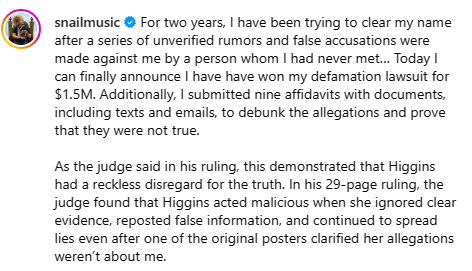Over the last four years, popular dubstep DJ Snails has been all over social media platforms due to allegations of sexual assault and sexual misconduct. Now, however, an Alberta judge has ruled in his favor in the amount of $1.5 million; the culmination of a defamation case brought against the owner of an Instagram account devoted to spreading these allegations about the Montreal based DJ.

Over his 29-page adjudication, Hon. Justice N.E. Devlin determined that all benchmarks for a defamation suit were met, and that Michaela Higgens (A.K.A Caeli La) was indeed the liable party. Interestingly, Justice Devlin also ruled “in summary” for Snails. This means that the evidence presented against Ms. Higgens was so thoroughly not disputed, and such Ms. Higgens had no defense, a trial was not needed; rather, the only issue at hand was the amount to be awarded.
[54] The suitability of this case for summary judgment turns largely on the fact that it has not been substantially defended. The contents of the publications are not at issue. Ms. Higgins’ identity as the publisher is not factually disputed. Her lack of first-hand knowledge about the facts is not disputed. Ms. Higgins has made no attempt to prove the truth of the allegations she republished. No defences are pled, and the unanswered affidavit evidence offers Mr. Durand’s full case as to why the defence of responsible communication on matters of public interest does not apply. For all these reasons, I am satisfied that a summary judgment process is appropriate in this case.
Durand v Higgins, 2024 ABKB 108 (CanLII), at para 54, https://canlii.ca/t/k3375#par54, retrieved on 2024-03-11
Furthermore, Justice Devlin’s decision takes each accusation into account [77-118]. He finds satisfactorily that many of these accusations are verifiably false or contradictory when subjected to the evidence presented to the court. Due to Ms. Higgens’ inability and decision not to defend any of these accusations, Snails receives a legal benefit to presume them false. Justice Devlin concludes that the burden of defamation was met, citing the fact that there was “No defence of truth; No defence of fair comment; No defence of qualified privilege; No defence of responsible communication; and Malice.”
V. Concluding Observations
[169] The “Me Too” movement has served a salutary and long overdue purpose in bringing the prevalence of sexual assault and harassment to the forefront of public attention. Concomitant with the need for increased awareness and accountability, there must be a legally safe space in which warnings can be made about the behaviour of public figures or others with access to vulnerable groups of potential victims.
[170] Ms. Higgins, however, blew recklessly past the boundaries of that space by unqualifiedly and unrestrainedly publishing statements painting Mr. Durand as a serial sexual abuser on the basis of false and/or unreliable sources.
[171] False, careless, and ill-motivated reports have the potential to do immense, unjust harm, as appears to have been the case with Mr. Durand. This terrain calls for careful objectivity, not unrestrained zealotry. Those who seek to publicize allegations for the public good must be careful to be fair and accurate towards the individuals who are the subject of those allegations. The immense and unfair damage done to Mr. Durand, coupled now with the serious consequences visited on Ms. Higgins, highlight the risks of blithely reposting often anonymous and deeply defamatory material from the lawless, fact-averse wildlands of social media.
[172] The application is allowed, and Mr. Durand is granted summary judgment, together with the damages and injunctive relief detailed above.
Durand v Higgins, 2024 ABKB 108 (CanLII), at para 169-172, https://canlii.ca/t/k3375#par169, retrieved on 2024-03-11
This case is one of the first of its kind, both in regard to its connection with electronic music as well as its call for a summary judgment. This is moreover an interesting case due to the fact that Ms. Higgens is also the woman who accused Space Jesus of sexual assault. It is unclear how this decision will affect any other current or future litigation moving forward.
We reached out to Michaela Higgens for comment – Ms. Higgens defended her actions, believing she is legally sound in the State of California. She stated that she is protected from an enforced judgement; this however hinges on whether or not the Alberta ruling is in line with our Constitutional First Amendment. It should be noted that Justice Devlin’s opinion is that the evidence “defeats all the defences to libel…under American law as well. [132]” She also described this case as a “classic case of libel tourism,” though her understanding of the term is incorrect. Libel tourism is used to describe a malicious and purposeful choice of court venue to take advantage of better defamation laws. It would be disingenuous to attribute such a term to Snails, as Canada is his home country and where he resides. If you’d like to read the whole decision, you can do so here.













